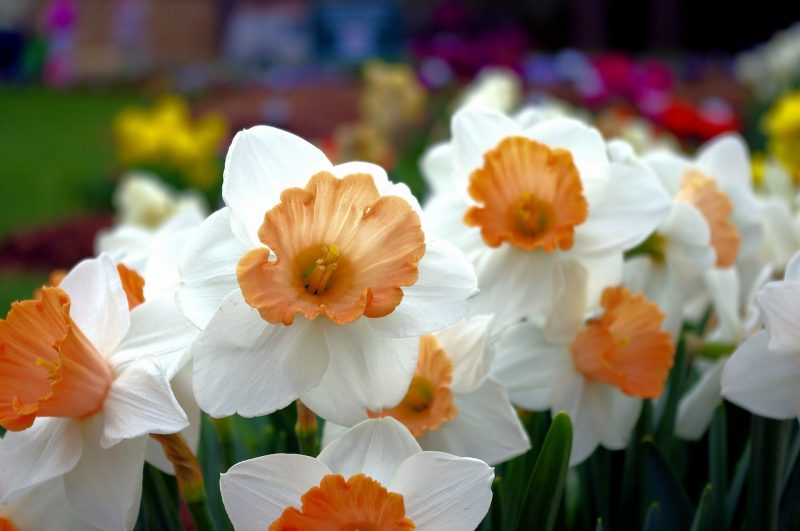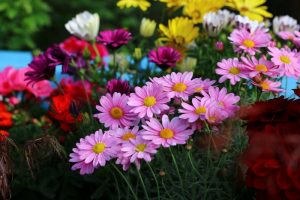Narcissus is one of the most exotic-sounding names to remember when spring flower trend comes. Narcissus flower (daffodils) are popular as garden decorations or arrangements. Despite the current popularity, this flower has been around since ancient times.
Before growing them, make sure you know seven important facts about daffodil narcissus.
Popular Daffodil Narcissus Types

There are about 17 narcissus types that gardeners commonly plant. Daffodil narcissus types consist of several varieties, such as:
- Long cup
Long cup daffodils have slightly deep trumpet shape, and one stem holds just one bloom. They are popular in cold regions. Popular varieties include Mount Hood, Dutch Master, and Goblet.
- Large cup
Large cup daffodils have wide bloom opening. The petals are circular and may be smooth or ruffled. Popular varieties include Red Devon, Ice Follies, and Professor Einstein.
- Small cup
Small cup daffodils are pretty and delicate, with flowers that have a wide opening. Barrett Browning is the most popular small cup daffodil.
- Triandrus
Triandrus daffodils have two or more blooms per stem. They are a little shorter than regular daffodils. Thalia daffodil is the most popular from this category.
- Cyclamineus
Cyclamineus has “pulled-back” trumpet shape. Like Triandrus, the Cyclamineus daffodils are shade-tolerant. Baby Boomer and Jetfire are among this type of daffodil.
- Tazetta
Tazetta is a fragrant daffodil that prefers a warm climate. It is not too hard, but the butterfly-like shape is very pretty. It has an orange center with white petals.
These common daffodil narcissus types are perfect for home gardens. You can plant them in soil or water pots.
Related: Sweet Pea Flowers
Narcissus Flower Characteristics

Narcissus flower are hardy and grow in abundance, so the care is not too difficult. Since they are flower springs, they require fall planting. They are often planted as potted flowers, park borders, or shrub gardens.
Narcissus flower characteristics may differ between each other, depending on whether they love a cold or warm climate. However, all of them love the full sun (or at least with partial shade). Some choose acidic soil, while others prefer alkaline, so ask the store first.
Narcissus Flower Meaning

Narcissus flower meaning in most cultures is positive. In England, this flower is associated with Lent. Most European countries regard narcissus flower as a symbol of rebirth and hope. This is because the flowers grow in spring.
Welsh people regard wild daffodil as a symbol of luck. They believe that anyone who finds the first daffodil in spring will get one year of luck. In China, people who grow daffodils during the New Year are said to be lucky.
Related: Poppy Flower Types
How to Grow Narcissus in Pots

Daffodils may be commonly found in the field or garden. However, they are also great as potted plants. You can grow narcissus in pots with 10 inches of depth (25 cm) and have drainage holes underneath.
Place clay granules at the bottom to prevent drainage problem. Add all-purpose soil mixture until it leaves a quarter part of the pot on top. Place the daffodil roots with their points upward. Bury them with the rest of the soil and cover them completely.
Water the daffodil roots thoroughly, but don’t flood them. Place them in a place that is free of frost during winter. You can also protect the roots with bubble wraps or straw during winter.
How to Grow Narcissus in Water

Yes, you can grow narcissus in water medium! This method is perfect if you prefer small amounts of daffodils as temporary decorations. Use any pretty container you want, as long as it is at least 5 inches high.
Have your narcissus root bulbs when you are ready for planting. Cover the third part of the container with a porous material, such as pebbles or gravels. Place bulbs close to each other before covering them with the rest of the medium.
Next, slowly pour water, but don’t let it touches the bulbs (use a glass container to see the water height). Place the container in a dark place until the roots grow (pull slightly to check if there is resistance). When the roots grow, move the container to sunny (but not hot) spot.
Finally, wrap any growing stems with twine, especially if your narcissus flower grows long. Place the container in a bright place with partial shade when the flower comes out.
Related: Types of Flowers
Common Narcissus Problems

Many common narcissus problems originate from the root bulbs. For example, planting the roots in shallow depth result in early opening and weak-looking flowers. Extreme frost or heat can also dry up the bulbs, making them refuse to grow roots and stems.
Mites and bulb fly maggots also attack narcissus bulbs, making the plants decayed and the bulbs softened. To prevent the spreading, soak the bulbs for three hours in hot water. Discard heavily-damaged bulbs, replace the soil or medium, and sterilize the container.
If your daffodils look weak and develop strange color streaks, it may be infected by the mosaic virus. Remove all the infected plants and soil and sterilize the container with bleach water.
Narcissus Arrangement Ideas

You can make narcissus arrangement in any container, from crystal vase to used teapot. Narcissus looks great alone or with other flowers. Cut the flowers in the early morning and soak them overnight in cold water to remove their toxic sap.
When the flowers are ready, fill the container with shallow cold water. Place the flowers in the circular arrangement, the taller in the middle. Insert smaller flowers such as foxgloves or lavender in-between. Place the container in a shaded, cool spot.
You can pour a packet of flower preservative into the water for longer freshness. Avoid placing the container near fresh fruits, because the ethylene gas from ripe fruits can age the flowers.
Conclusion
Daffodils is an elegant spring flower with bright colors, perfect for decoration. They need meticulous treatment, but you can plant them in soil or water. Follow the right steps to grow these iconic spring plants at home.



